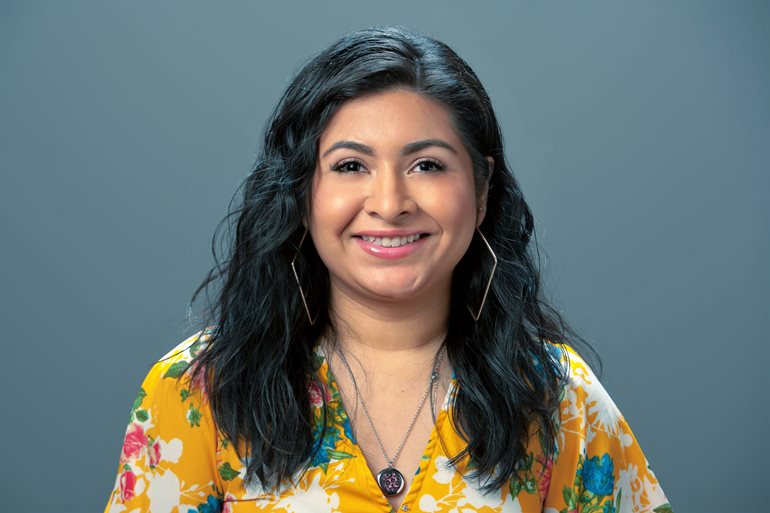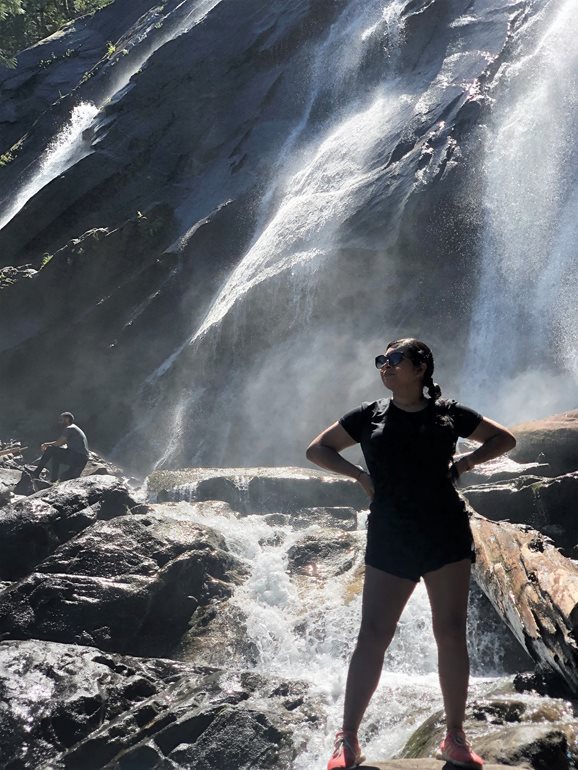
How has work in the Student Diversity Center changed since remote operations began at UW Bothell? Diana Betancourt Macias, undocumented focused program manager, answers a few questions from Director of Communications Maria Lamarca Anderson.
Q. What would you normally be doing now and where?
A. I would be meeting individually with students in my office, referring them to resources such as health care, housing and financial assistance, and helping them complete their DACA applications. That work now continues remotely.
I also would be meeting with groups of students in the diversity center lounge. A variety of faculty and staff would be milling about. They would come to the lounge to connect with students in a place where the students feel comfortable and are at ease. Often, they would bring yummy treats.
If this was “normal” times, the center would have an especially celebratory atmosphere: Three of our undocumented students have been accepted into graduate school!
To put that into perspective, [research shows that] only 1 to 3% of undocumented students graduate from college and that less than 1% go on to grad school. That three of our students are pursuing their master’s degrees is an extraordinary accomplishment. I became very emotional when I got the news. I wish we could have a big party to celebrate.
When I started this position two years ago, none of our undocumented students expressed interest in advanced degrees. They saw only the barriers, mainly financial. But when I modeled it was possible — I am undocumented, and I was in grad school when I started here — some students came to realize it was an option for them. It’s an awesome opportunity for them to improve their family’s lot in life.
Q. What are you trying to work on today?
A. My favorite part of my job is interacting with students. Now, I spend a lot of time teleconferencing with them. If we don’t have constant communication, they become distant and, worse, feel disconnected.
If it was noon on a Thursday, I would be in a Zoom with our Huskies Dream Team, a support group for our undocumented students. With DACA updates on a continuing basis, it’s hard for them to keep up with immigration rules and policies. We have these meetings so they feel supported and can stay on top of what’s required.
We are also working on ramping up our activity on social media, trying to get more undocumented students to join the team. It’s important to get the word out that UW Bothell aims to be a safe and welcoming campus for undocumented students.
Q. What adjustments have you made to do your work?
A. Once everything went online, our team immediately switched how we communicated with students and with each other. We use social media more, and we meet more intentionally versus starting a meeting wherever we passed each other in the hallway.
I was not equipped to work from home, so I made a huge investment in office furniture.
Q. What are you doing to care for yourself or for others?

A. I have such a passion for supporting the undocumented community — my community — that I’m constantly looking for ways to help. Helping people like me feeds and nourishes my spirit.
My sisters and I established the Betancourt Macias Family Scholarship Foundation in 2018 to provide scholarships to undocumented students. Initial funding came from my speaking engagements ranging from training on how to support undocumented students and/or communities to sharing my personal story to inspire and empower audiences. Over the past few weeks, we’ve been reviewing applications from across the country and have just chosen five students to award $1,000 scholarships.
Knowing our community would be especially hard hit by the pandemic, at the end of March we started an emergency relief fund for undocumented families in the United States and have raised more than $110,000.
We also started a “mask drive.” Undocumented people tend to be essential workers, and many of them don’t have access to personal protective equipment. So far, we’ve shipped about 600 masks to people throughout the states. These masks, by the way, were created by undocumented nurses (including my sister), other undocumented people and allies.
We have also assisted DACA recipients by sending them application materials to renew their DACA status. Many were not able to print their applications because they don’t have printers at home, and their typical sources — schools and libraries — were closed. So far, we’ve printed and sent more than 150 applications across the country!
And, my sisters and I lead Seeds 4 Liberation, a program that mentors students in middle school and high school to empower them to go to college. Not all of them are undocumented, but they are all underserved. I’m proud to say that 100% of our 2020 high school graduates were accepted into colleges and have the support they need to pay for their education and the supplies they need to succeed.
I graduated in June so now I have more time to fill. I do exercise every day: I want to be tired enough that I get a full night’s rest so I can start all over again the next day.
Q. Do you have a change of perspective to share – about life or work?
A. I see a growing need for people to help each other, and the only way we’ll get through this is together. I’ve become more aware of my privileges and have learned to use them to support people who are struggling to make ends meet.
Q. What other thoughts or feelings do you want to share?
A. My work has entailed a lot of putting out fires and helping our undocumented students find the resources they need, which primarily is financial.
I’m thrilled to say that with support from the UW Bothell advancement team, our dream of having a Dream Fund to provide financial relief to more students, including those who don’t qualify for traditional federal support, has just come true. We have great staff and allies on campus who work hard to make UW Bothell a safer place for our students.



